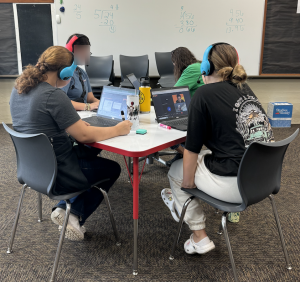Written by: Claudia Garcia
Summer break offers students a much-needed respite from the rigors of the academic year. However, it’s also an excellent opportunity to continue learning in a fun and engaging way. Incorporating technology into summer learning can help students retain knowledge, develop new skills, and prepare for the upcoming school year. Here’s how technology can be seamlessly integrated into summer learning.
- Online Tutoring
We believe that one of the best ways to take advantage of the vacations is not to stop practicing, that’s why at Papaya Tutor we offer interactive lessons on various subjects. Where your students can learn with bilingual tutors and have live classes in various areas, quizzes and interactive exercises that adapt to different learning styles. Students can set their own pace, reviewing challenging topics and advancing quickly through areas they understand well.

- Educational Apps
There are many educational apps designed to make learning fun. Apps like Duolingo for languages, Photomath for math problems and Tynker for programming introduce concepts through games and challenges. These apps are perfect for summer learning, as they can be used on the go, making it easy to incorporate learning into daily routines.
- Virtual field trips
Virtual field trips allow students to experience adventures without leaving home. Websites such as Google Arts & Culture offer visits to museums, landmarks and natural wonders around the world. This not only broadens students’ horizons, but also provides them with a rich, immersive experience that can spark their interest in new subjects.
- STEM kits and coding
STEM kits that include robotics, electronics and science experiments are ideal for hands-on learning. Companies like KiwiCo offer monthly subscription boxes that provide all the materials needed for exciting projects. In addition, coding platforms, offer summer coding challenges that encourage creativity and problem-solving skills.
- E-books and audiobooks
Fostering a love of reading is crucial, and technology makes it easier than ever. E-books and audiobooks can be accessed through apps such as Kindle and Audible. These resources allow students to explore a wide range of genres and topics, keeping their reading skills sharp over the summer.
- Virtual study groups
Learning is often more enjoyable with peers. Virtual study groups can be organized through platforms such as Zoom or Google Meet. These groups allow students to collaborate on projects, discuss books, or work together on difficult topics, fostering a sense of community and shared learning.
Incorporating technology into summer learning can make education an exciting and integral part of the summer break. It allows students to explore new interests, reinforce academic skills, and stay intellectually active. By utilizing interactive platforms, educational apps, virtual experiences, and online resources, parents and educators can create a balanced and enriching summer learning plan that prepares students for success in the upcoming school year.
For further information, please contact us here.